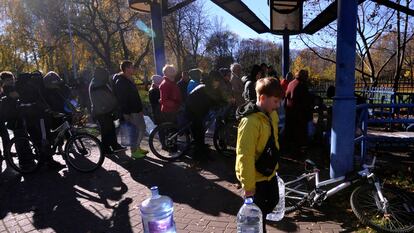Russia targets Kyiv with new wave of missile strikes
The latest attacks left 350,000 apartments in the capital without power and 80% of the city’s population with no access to water

Russian air strikes targeted a dozen regions of Ukraine on Monday, with missiles falling on the two largest cities in the country, Kyiv and Kharkiv, as well as other areas such as Zaporizhzhia, Dnipro, Odessa, Cherkasy, Poltava, Vinnytsia, Chernivtsi, Kirovohrad and Khmelnytskyi. The latest wave of attacks came on the 250th day of the Russian invasion and marked another Monday of air strikes following those that took place on October 10 and 17, when the main objectives were the country’s energy infrastructure. The Ukraine Ministry of Defense reported that its air defense systems managed to shoot down 44 missiles, but others reached their targets. One Russian missile landed on Moldovan territory, on the border with Ukraine.
A strike on Kyiv left 350,000 apartments without power, according to the city’s mayor, Vitali Klitschko, who said that state energy company Ukrenergo and the emergency services were working to restore supply. The Kyiv Independent stated that 80% of the city’s population had no access to water after Monday’s attacks.
Another batch of Russian missiles hits Ukraine’s critical infrastructure. Instead of fighting on the battlefield, Russia fights civilians. Don’t justify these attacks by calling them a ‘response’. Russia does this because it still has the missiles and the will to kill Ukrainians.
— Dmytro Kuleba (@DmytroKuleba) October 31, 2022
“Instead of fighting on the battlefield, Russia fights civilians”
Footage of anti-aircraft systems intercepting Russian missiles over Kyiv has been posted on social networks. The United States has accused Russia of carrying out a new “barbaric” attack and using cold weather and darkness as weapons against civilians, Washington’s ambassador to Kyiv, Bridget A. Brink, stated on her Twitter account. Ukrainian Minister of Foreign Affairs Dmytro Kuleba echoed Brink’s words: “Instead of fighting on the battlefield, Russia fights civilians. Don’t justify these attacks by calling them a ‘response.’”
From 7am on Monday air raid sirens sounded across Ukraine and message alerts were sent to cellphones, warning of the danger of imminent strikes and urging citizens to take refuge in shelters. The Ukrainian authorities manage these alerts and issue them when they detect Russian military movements involving fighter jets, drones or long-range missiles. About an hour after the alerts were sent, reports of Russian strikes began to flood in from regions in the north, south, east and west of the country.
In Kharkiv, the country’s second largest city, the subway service remains suspended. The governor of the northeastern region, Oleh Synyehubov, accused Moscow of launching attacks with S-300 long range surface-to-air missiles from the Russian city of Belgorod. The governor of Zaporizhzhia, Oleksandr Staruj, reported attacks on the southeastern region carried out by Russian warplanes.
Officials in the cities targeted said that as has been the case in previous attacks throughout October, essential power supply infrastructure was the main objective. Since October 10, the Kremlin has intensified its campaign to cripple Ukraine’s energy infrastructure. Around 40% of the country’s power grid has been damaged or destroyed on the cusp of winter, which is expected to tough for soldiers at the front and the harshest in decades for civilians.
Monday’s attacks were staged after the Russian Black Sea fleet was attacked off the coast of Sevastopol in the Crimean Peninsula on Saturday. After the strike on its naval forces, Moscow announced that it was suspending the agreement allowing grain to be exported from Ukraine to dozens of countries worldwide.
Tu suscripción se está usando en otro dispositivo
¿Quieres añadir otro usuario a tu suscripción?
Si continúas leyendo en este dispositivo, no se podrá leer en el otro.
FlechaTu suscripción se está usando en otro dispositivo y solo puedes acceder a EL PAÍS desde un dispositivo a la vez.
Si quieres compartir tu cuenta, cambia tu suscripción a la modalidad Premium, así podrás añadir otro usuario. Cada uno accederá con su propia cuenta de email, lo que os permitirá personalizar vuestra experiencia en EL PAÍS.
¿Tienes una suscripción de empresa? Accede aquí para contratar más cuentas.
En el caso de no saber quién está usando tu cuenta, te recomendamos cambiar tu contraseña aquí.
Si decides continuar compartiendo tu cuenta, este mensaje se mostrará en tu dispositivo y en el de la otra persona que está usando tu cuenta de forma indefinida, afectando a tu experiencia de lectura. Puedes consultar aquí los términos y condiciones de la suscripción digital.








































